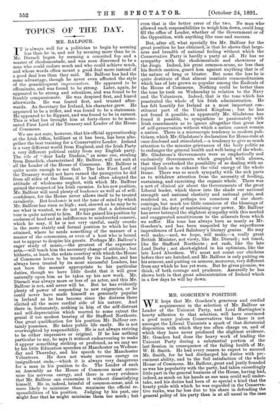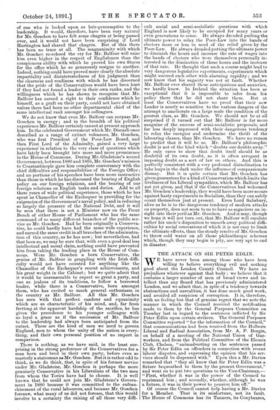MR. GOSCHEN'S POSITION.
WE hope that Mr. Goschen's generous and cordial acquiescence in the selection of Mr. Balfour as Leader of the Unionist Party, and Lord Hartington's hearty adhesion to that selection, will have convinced a good many jealous Conservatives that there is not amongst the Liberal Unionists a spark of that dictatorial disposition with which they too often charge us, and of which they have never produced the slightest evidence. Mr. Goschen had done the heavy work of leading the Unionist Party during a substantial portion of the last Session in consequence of the failing health of Mr. W. H. Smith. He had every reason to expect to succeed Mr. Smith, for he had discharged his duties with pre- eminent ability, and to the full satisfaction of the whole House of Commons. Mr. Balfour, great and justly founded as was his popularity with the party, had taken exceedingly little part in the general business of the House, having had, indeed, as much on his hands as one man could well under- take, and his duties had been of so special a kind that the hearty pride with which he was regarded in the Conserva- tive ranks, was far less due to his share in defending the general policy of his party than is at all usual in the case of one who is looked upon as heir-presumptive to the leadership. It would, therefore, have been very natural for Mr. Goschen to have felt some chagrin at being passed over, and it would not have been surprising if Lord Hartington had shared that chagrin. But of this there has been no trace at all. The magnanimity with which Mr. Goschen re-echoed the cry for Mr. Balfour will raise him even higher in the respect of Englishmen than the conspicuous ability with which he proved his own fitness for the office which he so generously resigns to another. Indeed, nothing could have proved more clearly the absolute impartiality and disinterestedness of his judgment than the clearness and readiness with which he has discerned that the pride of the Conservatives would have been hurt if they had not found a leader in their own ranks, and the willingness which he has shown to recognise that Mr. Balfour has earned a right to their confidence which he himself, as a graft on their party, could not have obtained unless there had been no other departmental chief of the same intellectual rank amongst his colleagues.
We do not know that even Mr. Balfour can surpass Mr. Goschen in energy ; and in the breadth of his political experience Mr. Balfour certainly cannot at present approach him. In the celebrated Government which Mr. Disraeli once described as a range of extinct volcanoes, Mr. Goschen, who was first President of the Poor-Law Board, and then First Lord of the Admiralty, gained a very large experience in relation to the very class of questions which have lately been brought into more and more prominence in the House of Commons. During Mr. Gladstone's second Government, between 1880 and 1885, Mr. Goschen's mission to Constantinople gave him complete conversancy with the chief difficulties and responsibilities of the Foreign Office ; and no portions of his speeches have been more instructive than those in which he has discussed the bearing of English policy on our foreign relations, and the bearing of our foreign relations on English tasks and duties. Add to all these years of wide political experience, those which he ha s spent as Chancellor of the Exchequer in providing for the exigencies of the Government's naval policy, and in reducing so largely the pressure of the National Debt, and it will be seen that there is not a Minister now on the Front Bench of either House of Parliament who has the same command of so many different branches of the public ser- vice as Mr. Goschen. Had be been originally a Conserva- tive, he could hardly have had the same wide experience, and earned the same credit in all branches of the administra- tion of this country, as he has now ; but nevertheless, had that been so, we may be sure that, with even a good deal less intellectual and moral claim, nothing could have prevented him from taking the leading place in the House of Com- mons. Were Mr. Goschen a, born Conservative, the genius of Mr. Balfour in grappling with the Irish diffi- culty would not have counted for anything like the Chancellor of the Exchequer's recent achievements, and his great weight in the Cabinet ; but we quite admit that it would be unreasonable to expect so great a party, and one so jealous of its traditions, to follow a borrowed leader, while there is a Conservative, born amongst them, who has excited so much general enthusiasm in the country as Mr. Balfour. All this Mr. Goschen has seen with that perfect candour and equanimity which are so characteristic of his mind, and, far from fretting at the apparent hardship of the sacrifice, he has given the precedence to his younger colleague with as loyal a grace as if the succession of Mr. Balfour to the leadership had always been anticipated from the outset. These are the kind of men we need to govern England, men to whom the unity of the nation is every- thing, and their own personal position of no import in comparison.
There is nothing, as we have said, in the least sur- prising in the strong preference of the Conservatives for a man born and bred in their own party, before even so masterly a statesman as Mr. Goschen. But it is rather odd to think, as we do think, that, in spite of his former service under Mr. Gladstone, Mr. Goschen is perhaps the more genuinely Conservative in his Liberalism of the two men from whom the Tories have had to choose. It is well known that he could not join Mr. Gladstone's Govern- ment in 1880 because it was committed to the enfran- chisement of the rural labourers, and because Mr. Goschen foresaw, what many of us did not foresee, that this would involve to a certainty the raising of all those very diffi- cult social and semi-socialistic questions with which. England is now likely to be occupied for many years or even generations to come. He always dreaded putting the ultimate power to relax the Poor-Law into the hands of electors more or less in need of the relief given by the Poor-Law. He always dreaded putting the ultimate power to diminish the hours and increase the rate of wages into the hands of electors who were themselves personally in- terested in the diminution of those hours and the increase of that rate. He thought that such a course might lead to very dangerous legislative experiments, experiments which might succeed each other with alarming rapidity ; and we now know that his sagacity was not at fault. Whether Mr. Balfour ever shared these anticipations and anxieties, we hardly know. In Ireland the situation has been so exceptional that it is impossible to infer from hie policy there that he did not share them. But at least the Conservatives have no proof that their new Leader is nearly so sensitive to the various dangers of the attempt to ameliorate on a large scale the condition of the poorest class, as Mr. Goschen. We should not be at all surprised if it turned out that Mr. Balfour is far more sanguine of the success of semi-socialistic proposals, and far less deeply impressed with their dangerous tendency to relax the energies and undermine the thrift of the labouring classes, than Mr. Goschen. We have no reason to predict that it will be so. Mr. Balfour's philosophic doubt is not of the kind which " doubts our doubts away." He only cares to show that doubt itself should be as doubtful of its own doubt, as it is often arrogant in imposing doubt as a sort of law on others. And this is perfectly consistent with a very profound disinclination to take leaps in the dark under the influence of compassionate dismay. But it is quite certain that Mr. Goschen has given guarantees for a kind of Conservatism which limits the liveliness of his Liberal sympathies, which Mr. Balfour has not yet given, and that if the Conservatives had welcomed Mr. Goschen's leadership, they would have been more secure against hasty experiments in Socialism, than they can safely count themselves just at present. Even Lord Salisbury, alive as he is to the dangerous tendency of modern attacks on property, does not seem to us to have as sagacious an in- sight into their peril as Mr. Goschen. And it may, though we hope it will not turn out, that Mr. Balfour will emulate rather his uncle's disposition to smooth away political diffi- culties by social concessions of which it is not easy to limit the ultimate effects, than the steady resolve of Mr. Goschen to throw cold water on all those philanthropic schemes which, though they may begin in pity, are very apt to end in disaster.



































 Previous page
Previous page